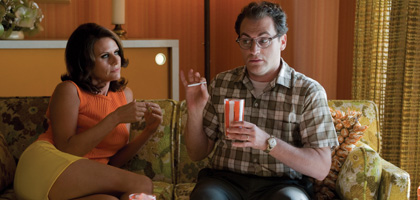Primary navigation


While true to the Coens' absurdist spirit, 'A Serious Man' - unusually for them - features a realistic, empathetic character in a realistic setting, the suburban Midwest in the 1960s. It's a fascinating mix, says Michael Atkinson
In 25 years of film-making, Joel and Ethan Coen have established themselves as a major international voice, a postmodern sensibility overcome with cosmic jokiness. If No Country for Old Men, in all of its Oscar-winning graveness, was the Coen brothers movie for those who don't like Coen brothers movies, then A Serious Man may alienate the newfound viewer base all over again. It is simultaneously their most personal film - almost autobiographical in its details - and their most muddled, caught like a hairball in the throat (a frustrated simile they'd appreciate) between earnestness and mockery. For perhaps the first time in a Coen film outside No Country we are asked to authentically empathise with a realistic character in a realistic setting, and yet he and the landscape around him suffer the same lampooning slings and sardonic tone as the characters of Raising Arizona (1987), Barton Fink (1991), Fargo (1995) and O Brother, Where Art Thou? (2000). It's an old complaint about the Coens, that they cruelly observe their hapless characters as they would pratfalling ants in an ant farm. But I've always thought their comic spirit, for better or worse, has been consistent and sharply observed, allowing melancholy and sensitivity to sneak in naturally like the back-flavours of strong red wine. And now comes A Serious Man, a sincerely sympathetic portrait of an American family man in crisis - even as it insults its characters and derides their culture.
What seem like Coen-esque cheap shots to some viewers have always been read as zesty absurdism by others. Perhaps the reason A Serious Man chafes is because it is centred in such familiar territory: 1960s American suburbia, where lawnmowing and wage-earner-and-homemaker domestic routine were the preoccupations, masking a secret battlefield of betrayal, frustration, sexual alternatives and - of course - doubts about one's own empty materialism. We've seen mayhem play out in this arena many times before, from Blue Velvet to American Beauty, Revolutionary Road and TV's Mad Men, and if you're a suburbanite it's easy to see the condescension coming at you in spadefuls. The Coens have reincarnated the Minnesota suburbs of their youth and focused on the milieu's Jewish contingent, but like the two Sam Mendes films mentioned above, A Serious Man caricatures nearly every aspect of suburban life, leaving us to wonder whether we should be laughing at how Jews slurp soup or how teenage girls do nothing but wash their hair or how fat people walk - even as we reluctantly chuckle.
The film's Jewishness is the main course offered for digestion - the Job-like descent into lucklessness of Larry Gopnik, the beleaguered physics-prof hero, beginning with his irritable wife's demand for a divorce. Larry embarks on a series of consultations with rabbis, looking for 'the answer' to life's mysteries. As expressly Torah-informed as Woody Allen's Crimes and Misdemeanors, but without that film's genuine ethical gravity, A Serious Man is formed around the contest between the reasonless chaos of life and our traditional cultures' desire to see order in it; but there's not much real discourse on hand, and no larger metaphysical idea. The Coens have only occasionally stumbled into a fascinating world-view (for all of its genre irony, 1990's Miller's Crossing gets my vote), because they are instead masters of minutiae. Their new film is (again, typically) chin-deep in cultural details; the brothers get every little thing absolutely right, however broadly, from the Jewish-American style of marital bickering to the different rabbis' wise-yet-clueless solicitousness, to the Hebrew school boredom. Knowing a little Hebrew helps, but is not essential; the milieu is articulated with care - but for sport, just as the Minnesotans were (gently) chided in Fargo and East Coast narcissism was ripped apart in Burn after Reading.
Other period details are inspired and unarguable: the slightly-off uncle sleeping on the couch and forever draining an abscess on his neck with a plug-in machine; the Korean student who tries ineptly to insist his F should get changed to a passing grade; the way Larry is bulldozed and silenced by the soothing rabbi-like arguments of his wife's new lover; the dogged harassment of an agent of the Columbia Record Club; even the aluminium 'G' in the Gopniks' front screen door. But nailing down the day and age is one thing; the fact remains that Larry's son (whose bar mitzvah climaxes the film) is little more than a complaining joint-sneaker, his wife merely an inscrutable harridan, and so on. Amy Landecker's hot-pants neighbour's wife Mrs Samsky, Peter Breitmayer's bullet-head bigot Mr Brandt, the various synagogue employees we meet, all are similarly reduced to stark and laughable types.
This not only works against the nature of Larry's tragic story - caused as it is not by human folly but by a confluence of unrelated bad things (only beginning with his family and his income) - but also against the moral questions the screenplay puts in his mouth. Is there much point in speculating about the justice of the universe and the purpose of 'a good life' if the movie you're in defines everything and everyone around you as a shallow hoot?
Argue if you like that this movie's philosophical inquiries are answered by the Coens' ridicule - that life, like the film, is merely a thin joke by a cruel God or gods. What respect could the cosmos have for Larry (masterfully played by Michael Stuhlbarg in a perpetual reactive sputter) and his world if the film-makers have little or none? The tonal inhospitality is a pity, because the movie is - in the enjoyable Coen paradigm - constructed like a clock that's just on the verge of throwing gears, full of inventive nonsense and restlessly devoted to favouring eccentric texture over lockstep narrative, contrary to the manner of most American films. A Serious Man even thieves a little from Quentin Tarantino's playbook, but in a good way: the pre-credit sequence is set in a 19th-century shtetl, where a couple face off against a dybbuk, suggesting the modern quandaries to come. One rabbi's loony story about a dentist discovering Hebrew letters on a patient's teeth is a promising Tarantino-esque digression, but it goes nowhere. How could it when it promises mystical answers to life's purpose, and the film is designed as a statement of life's haphazardness?
Though there are no acting epiphanies here to rival Tony Shalhoub's in Barton Fink or Jennifer Jason Leigh's in The Hudsucker Proxy (1994), A Serious Man doesn't have a single dull or merely functional performance; even bit players have their pregnant comic moments. Still, the spectre of Richard Kind's Uncle Arthur may be the movie's conceptual triumph. Half-hidden in the bathroom for the first part of the film, he emerges as a profound mystery. Homeless and strange, he appears to us (via a thick notebook of obsessive scribblings) as a shut-in Charles Crumb figure, but then he is stalked by the police for playing illegal cards, and then for sodomy. When did he even leave the house? By the time Arthur succumbs to a breakdown, declaring his envy for Larry's good fortune, neither we nor Larry know what to make of him. He may be the only character in the film who slips the noose of the film-makers' single-minded derision - and he does it magnificently.
Film of the Month: No Country for Old Men reviewed by Ben Walters and J.M. Tyree (February 2008)
Film of the Month: Intolerable Cruelty reviewed by Ben Walters (November 2003)
Film of the Month: O Brother, Where Art Thou? reviewed by Kevin Jackson (October 2000)